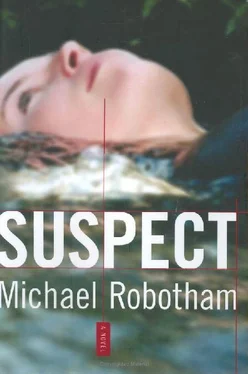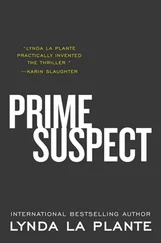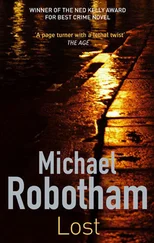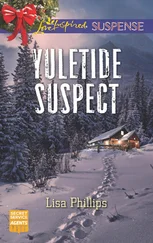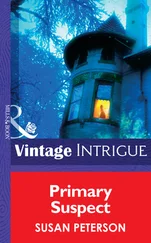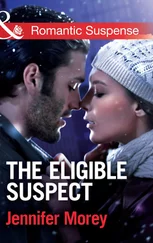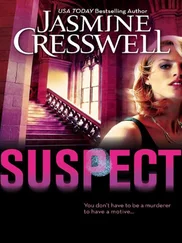Michael Robotham - Suspect
Здесь есть возможность читать онлайн «Michael Robotham - Suspect» весь текст электронной книги совершенно бесплатно (целиком полную версию без сокращений). В некоторых случаях можно слушать аудио, скачать через торрент в формате fb2 и присутствует краткое содержание. Жанр: Триллер, на английском языке. Описание произведения, (предисловие) а так же отзывы посетителей доступны на портале библиотеки ЛибКат.
- Название:Suspect
- Автор:
- Жанр:
- Год:неизвестен
- ISBN:нет данных
- Рейтинг книги:4 / 5. Голосов: 1
-
Избранное:Добавить в избранное
- Отзывы:
-
Ваша оценка:
- 80
- 1
- 2
- 3
- 4
- 5
Suspect: краткое содержание, описание и аннотация
Предлагаем к чтению аннотацию, описание, краткое содержание или предисловие (зависит от того, что написал сам автор книги «Suspect»). Если вы не нашли необходимую информацию о книге — напишите в комментариях, мы постараемся отыскать её.
Suspect — читать онлайн бесплатно полную книгу (весь текст) целиком
Ниже представлен текст книги, разбитый по страницам. Система сохранения места последней прочитанной страницы, позволяет с удобством читать онлайн бесплатно книгу «Suspect», без необходимости каждый раз заново искать на чём Вы остановились. Поставьте закладку, и сможете в любой момент перейти на страницу, на которой закончили чтение.
Интервал:
Закладка:
"We're closed for Christmas," she says. "I shouldn't even be here. I was just tidying up the office."
I make up a story about a sick friend who wants to track down his old mates. I'm looking for yearbooks or class photographs from the mid-eighties. She thinks the library has a cupboard full of that sort of thing. I should call back in the New Year.
"It can't wait that long. My friend is very sick. It's Christmas."
"I might be able to check," she says sympathetically. "What year are you looking for?"
"I'm not exactly sure."
"How old is your friend."
"Twenty-two."
"What is his name?"
"I think his name might have been different back then. That's why I need to see the photographs. I'll be able to recognize him."
She is suddenly less sure of me. Her suspicion increases when I suggest coming to the school. She wants to ask the headmistress. Better still, I should put my request in writing and send it by post.
"I don't have time. My friend…"
"I'm sorry."
"Wait! Please! Can you just look up a name for me? It's Bobby Moran. He might have worn glasses. He would have started in about 1985."
She hesitates. After a long pause she suggests that I call her back in twenty minutes.
I go in search of fresh air. Outside, at the entrance to an alley, a man stands beside a blackened barrow. Every so often he yells, "Roooooost chestnooooots," making it sound as plaintive as a gull's cry. He hands me a brown paper bag and I sit on the steps, peeling the sooty skin from the warm chestnuts.
One of my fondest memories of Liverpool is the food. The fish and chips and Friday night curries. The jam roly-poly, bread and butter pudding, treacle sponge, bangers and mash… I also loved the odd assortment of people-Catholics, Protestants, Muslims, Irish, African and Chinese-good workers, fiercely proud and not afraid to wear their hearts and wipe their noses on the same sleeve.
The school secretary is less circumspect this time. Her curiosity has been sparked. My search has become hers.
"I'm sorry, but I couldn't find any Bobby Moran. Are you sure that you don't mean Bobby Morgan? He was here from 1985 to 1988. He left in third grade."
"Why did he leave?"
"I'm not sure." Her voice is uncertain. "I wasn't here then. A family tragedy?" There is someone she can ask, she says. Another teacher. She takes the name of my hotel and promises to leave a message.
Back at the color-coded volumes I go through the names again. Why would Bobby change his surname by a single letter? Was he breaking with the past or trying to hide from it?
In the third volume I find an entry for Robert John Morgan. Born 24 September 1980 at Liverpool University Hospital. Mother: Bridget Elsie Morgan (nee Aherne). Father: Leonard Albert Edward Morgan (merchant seaman).
I still can't be absolutely sure that it's Bobby, but the chances are good. I fill out a pink application form to order a copy of his full birth certificate. The clerical officer behind the glass screen has an aggressive chin and flared nostrils. He pushes the form back toward me. "You haven't stated your reasons."
"I'm tracing my family history."
"What about your postal address?"
"I'll pick it up from here."
Without ever looking up at me, he thumps the applications with a fist-sized stamp. "Come back in the New Year. We close from Monday for the holidays."
"But I can't wait that long."
He shrugs. "We open until midday on Monday. You could try then."
Ten minutes later I leave the exchange building with a receipt in my pocket. Three days. I can't wait that long. In the time it takes me to cross the pavement I make a new plan.
The offices of The Liverpool Echo look like a mirrored Rubik's cube. The foyer is full of pensioners on a day tour. Each has a souvenir bag and a stick-on name tag.
A young receptionist is sitting on a high stool behind a dark wooden counter. She is small and pale, with curry-colored eyes. To her left is a metal barrier with a swipe-card entry that separates us from the lifts.
"My name is Professor Joseph O'Loughlin and I was hoping to use your library."
"I'm sorry but we don't allow public access to the newspaper library." A large bunch of flowers is sitting on the counter beside her.
"They're lovely," I say.
"Not mine, I'm afraid. The fashion editor gets all the freebies."
"I'm sure you get more than your share."
She knows I'm flirting, but laughs anyway.
"What if I want to order a photograph?" I ask.
"You fill out one of these forms."
"What if I don't know the date, or the name of the photographer?"
She sighs. "You don't really want a photograph, do you?"
I shake my head. "I'm looking for a death notice."
"How recently?"
"About fourteen years."
She makes me wait while she calls upstairs. Then she asks if I have anything official looking, like a security pass or business card. She slides it into a plastic wallet and pins it to my shirt.
"The librarian knows you're coming. If anyone asks you what you're doing, say you're researching a story for the medical pages."
I take the lift to the fourth floor and follow the corridors. Occasionally I glimpse a large open-plan newsroom through the swing doors. I keep my head down and try to walk with a sense of purpose. Every so often my leg locks up and swings forward as though in a splint.
The librarian is in her sixties, with dyed hair and half-glasses that hang around her neck on a chain. She has a rubber thimble on her right thumb for turning pages. Her desk is surrounded by dozens of cacti.
She notices me looking. "We have to keep it too dry in here for anything else to grow," she explains. "Any moisture will damage the newsprint."
Long tables are strewn with newspapers. Someone is cutting out stories and placing them in neat piles. Another is reading each story and circling particular names or phrases. A third uses these references to sort the cuttings into files.
"We have bound volumes going back 150 years," says the librarian. "The cuttings don't last that long. Eventually they fall apart along the edges and crumble into dust."
"I thought everything would be on computer by now," I say.
"Only for the past ten years. It's too expensive to scan all the bound volumes. They're being put onto microfilm."
She turns on a computer terminal and asks me what I need.
"I'm looking for a death notice published around 1988. Leonard Albert Edward Morgan…"
"Named after the old king."
"I think he was a bus conductor. He might have lived or worked in a place called Heyworth Street."
"In Everton," she says, flicking at a keyboard with two fingers. "Most of the local buses either start or finish at the Pier Head or Paradise Street."
I make a note of this on a pad. I concentrate on making the letters large and evenly spaced. It reminds me of being back in preschool-tracing huge letters on cheap paper with crayons that almost rested on your shoulder.
The librarian leads me through the maze of shelves that stretch from the wooden floor to the sprinklers on the ceiling. Eventually we reach an old oak desk, scarred by cutting blades. A microfiche machine sits at the center. She flicks a switch and the motor begins to hum. Another switch turns on the bulb and a square of light appears on the screen.
She hands me six boxes of film covering January to June 1988. Threading the first film onto the spools she presses fast-forward, accelerating through the pages and knowing almost instinctively when to stop. She points to the public notices and I make a note of the page number, hoping it will be roughly the same each day.
I trace my finger down the alphabetical listing looking for the letter M. Having satisfied myself there are no Morgans, I accelerate forward to the next day… and the next. The focus control is finicky and has to be constantly adjusted. At other times I have to pan back and forth to keep the newspaper columns on-screen.
Читать дальшеИнтервал:
Закладка:
Похожие книги на «Suspect»
Представляем Вашему вниманию похожие книги на «Suspect» списком для выбора. Мы отобрали схожую по названию и смыслу литературу в надежде предоставить читателям больше вариантов отыскать новые, интересные, ещё непрочитанные произведения.
Обсуждение, отзывы о книге «Suspect» и просто собственные мнения читателей. Оставьте ваши комментарии, напишите, что Вы думаете о произведении, его смысле или главных героях. Укажите что конкретно понравилось, а что нет, и почему Вы так считаете.
